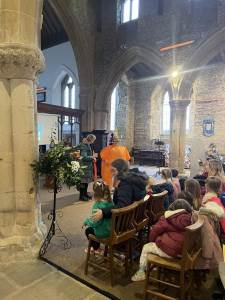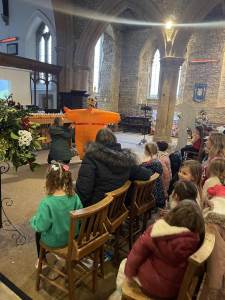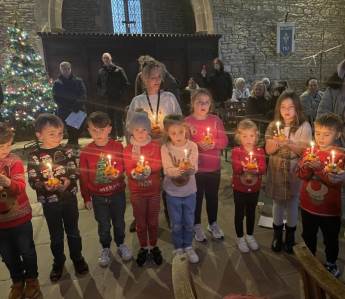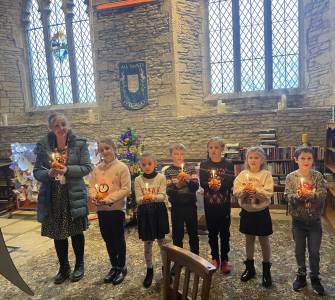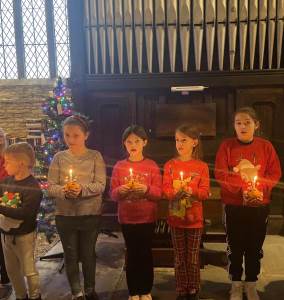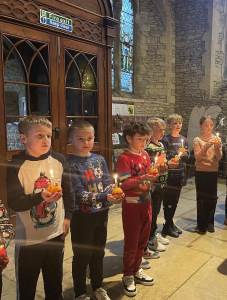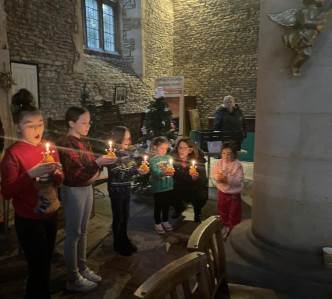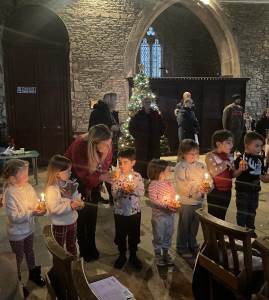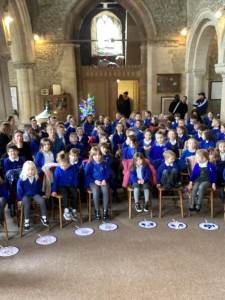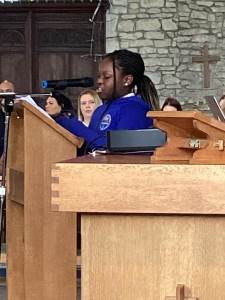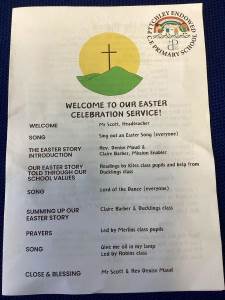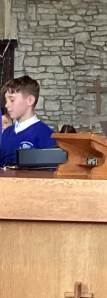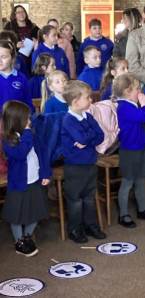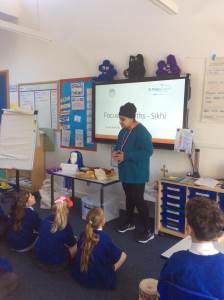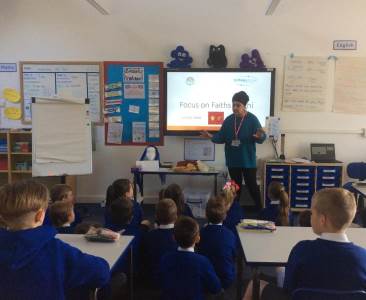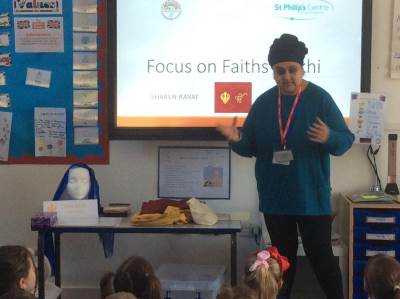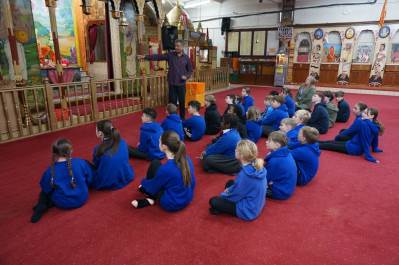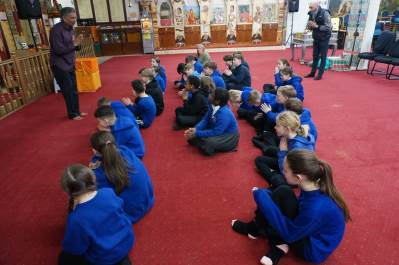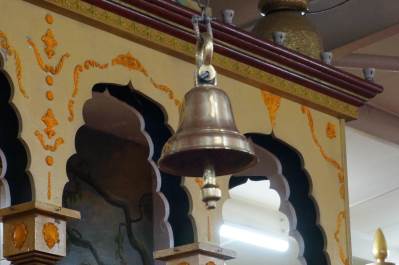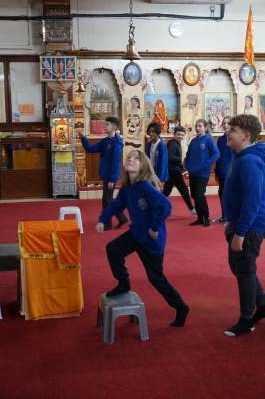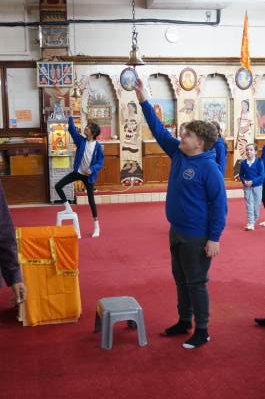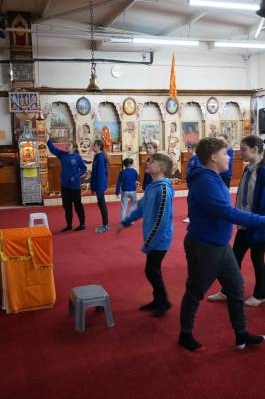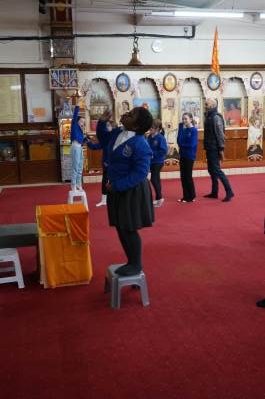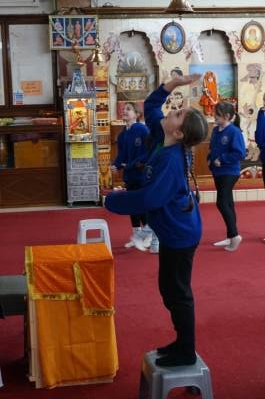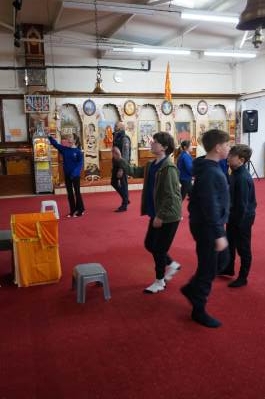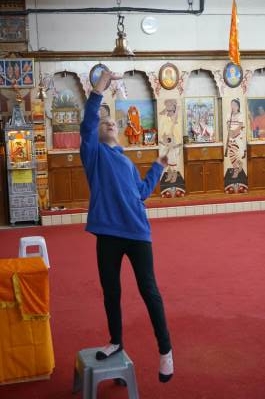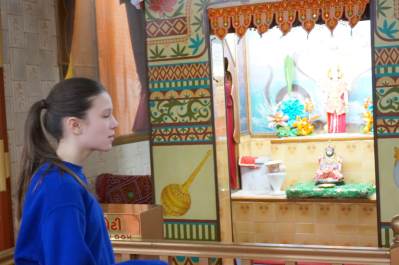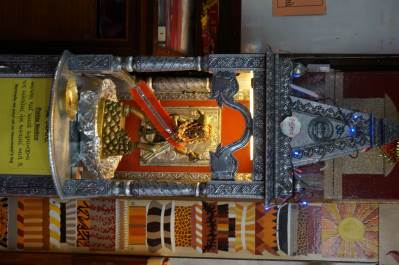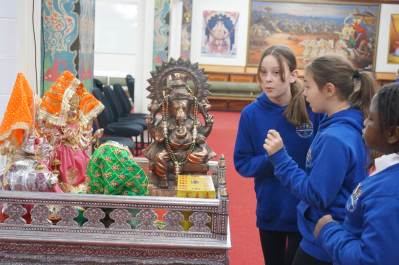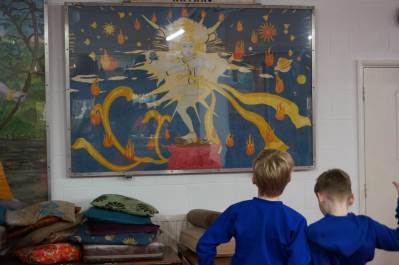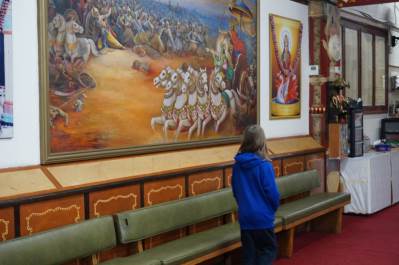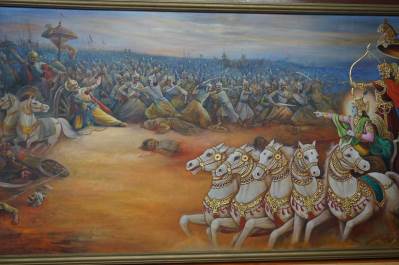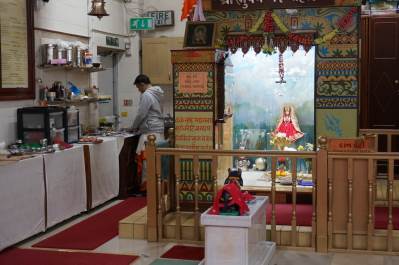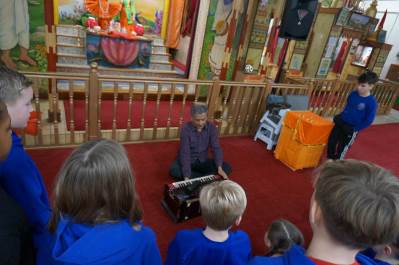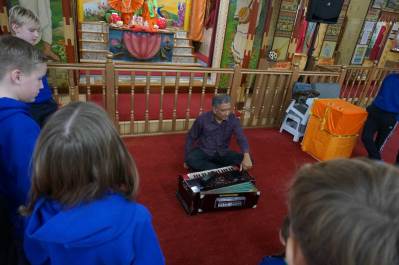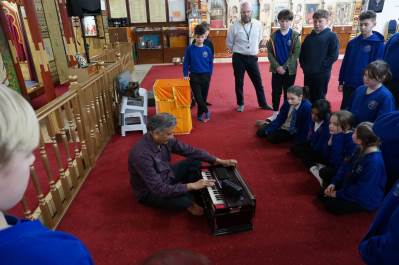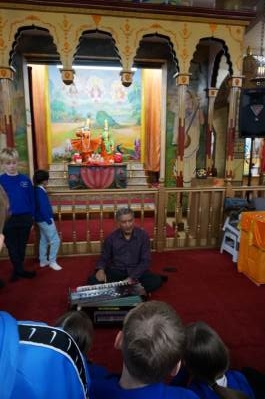Being a Church School
Collective Worship
Pytchley Church of England Primary School is part of Peterborough Diocese Education Trust (PDET). This policy for Collective Worship is consistent with the purpose and aims of the school and Peterborough Diocese Education Trust (PDET) as well as the Trust Deed upon which the school was founded.
- ‘To help each individual develop those qualities of mind, body and spirit, feeling and imagination, that will enable them to live a fulfilling life’.
- Religious worship shall be in accordance with the faith and practice of the Church of England
As required by law [Section 6 of the Education Reform Act 1988] all pupils are expected to take part in an act of collective worship each day.
Aims and Objectives
In addition to the aims already stated, at Pytchley CofE Primary School, Collective Worship is at the heart of our life and work. We provide an opportunity for pupils and staff to worship in a traditional Christian style, which is consistent with the beliefs and practices of the Church of England.
We believe that worship should be:
- Inclusive. Everyone can benefit and contribute, no matter what their personal belief or commitment.
- Appropriate to the age of the children.
- An important learning experience which enriches the life of those people who attend.
- A very special occasion, the purpose of which is to show reverence to God.
- Helpful to participants understanding of and identification with the school’s vision, values and aims, promoting a sense of community.
- In line with the 1988 Education Reform Act, which states that collective worship should be 'wholly or mainly of a broadly Christian character', we normally base our assemblies on the teachings of Christ and the traditions of the Christian Church. However, we conduct our assemblies in a manner that is sensitive to the faiths and beliefs of all members of the school. While most acts of worship in our school are Christian, we also hold assemblies that reflect the traditions of other religions that are represented in the school and the wider community.
Organisation of Collective Worship
We hold a daily act of collective worship. This can be either as whole-school collective worship or in individual classes. We conduct collective worship in a dignified and respectful way. Collective worship is a period of calm reflection. We regard it as a special time; we create an appropriate atmosphere by using music or other objects, to focus the attention of the children. We always light a candle to signify the start of worship. We invite the children to participate in prayer, reflection, and songs. We create an appropriate atmosphere by using music and a cross and our school candle that acts as a focal point for the attention of the pupils and those present. Our altar table and classroom reflection areas are always dressed in accordance with the colours of the liturgical seasons. Collective worship is led by the head teacher, members of staff, the children, local guests.
The School Values of compassion, respect, honesty, perseverance, forgiveness, and trust are explored through our times of Collective Worship, and we spend one term in every academic year considering each value. A Bible verse reflecting each value is shared at the start of each term. This verse is then shared by the whole school community during each time of collective worship throughout the term. Each termly focus is then broken down to last for a week. Worship is planned for the whole term in advance, and they are shared with all via the school website. We take the themes of our worship from the traditions of the Christian faith, and we reflect the festivals and events of the Christian calendar. We also use Roots and Fruits Creative Collective Worship Programme as a tool for staff to deliver the Christian Values themes.
All teaching staff are expected to lead whole school worship. As well as school staff, whole school worship will also be taken by children and guests from the local All Saints Church. This brings greater variety to our worship times and strengthens links between the Academy and the local community as well as building the skills of the pupils. Parents / carers are invited to Friday Collective Celebration Worship and other special services, e.g. at Christmas, Easter and the end of the academy year. This promotes the community spirit of the Academy. We welcome governors’ attendance at our Collective Worship at any time.
Other opportunities for prayer and reflection are given throughout the week that include: Wednesday lunchtimes prayer, class lunch time prayer and in classes during class based worship. Worship opportunities are also offered to staff, children and their families as we attend services (e.g. Christingle, Education Sunday and end of year services in Church)
Each act of collective worship begins in a consistent way whether being led by adults or children. This approach allows all children and adults the opportunity to read the school vision and mission statements along with the chosen termly bible verse.
Evaluating the impact of Collective Worship on the School Community
Monitoring the policy and practice of collective worship is the role of the Collective Worship Leader in school and the Section 48 Committee. The monitoring of the quality of worship involves:
- Regular review of the quality of worship through observation, feedback from various stakeholders and review of planning.
- On a termly basis the staff discuss the quality of Collective Worship and suggest ways this could be improved. This feeds into the next term’s planning, where possible.
Right of Withdrawal
Parents can request permission for their child to be excused from religious worship, and the school will make alternative arrangements for the supervision of the child during that part of the assembly. Parents and carers do not have to explain or give reasons for their request. This right of withdrawal complies with the 1944 Education Act and was restated in the 1988 Education Reform Act.
The Headteacher keeps a record of all children who have been withdrawn from collective worship.
Collective Worship Planner - Autumn 1 - 2024-2025 Respect
Collective Worship Planner - Autumn 2 - 2024-2025 Friendship
Collective Worship Planner - Spring 1 - 2024-2025 Responsibility
Collective Worship Planner - Spring 2 - 2024-2025 Truth
Collective Worship Planner - Summer 1 - 2024-2025 Resilience
RE
RE Intent, Implementation, and Impact
With God all things are possible. Matthew 19-24
Our Pathway:
Working together as one, through the affirmation of God’s love within a distinctively Christian ethos, we aim to educate for:
- Wisdom and Knowledge
- Hope and Aspiration
- Community and
- Living Well Together
- Dignity and Respect
- Promote a positive, open and honest culture which embraces and nurtures these.
We ensure Pytchley CE Primary is inclusive, serves the local community and welcomes all: children of the Christian faith, of other faiths or of no faith.
Inclusivity
We ensure our curriculum is accessible to all.
Intent (the what)
In our Trust the curriculum is broadly defined as the knowledge students are expected to learn (including spiritual, moral, social and cultural) through the totality of experiences provided in our children’s primary schooling. By knowledge we mean facts, concepts and rules (declarative knowledge: to know that…), and procedural knowledge (skills: to know how….) acquired through experience and /or education.
We aim for our knowledge-rich curriculum to enable:
- Sustained mastery (and a greater understanding for those who are capable) of subject specific key knowledge that we want the children to acquire;
- Sustained mastery of knowledge that pupils will need to be able to make sense of the world by providing rich cultural capital.
We deliver the National Curriculum 2014 throughout Key Stage 1 and 2 providing pupils with ‘an introduction to the essential knowledge that they need to be educated citizens and to the best that has been thought and said, helping to engender an appreciation of human creativity and achievement’.
The principle aim of our RE is to enable pupils to hold balanced and informed conversations about religion and belief.
This will help them to:
- Make sense of a range of beliefs
- Understand the impact of beliefs on lives
- Make connections between faiths and how faith is relevant in the world today.
We regard our RE curriculum as the progression model. We focus on knowledge progression within the context of themes or projects following Peterborough Diocese Agreed Syllabus, and by using Understanding Christianity. Hence, our long term aim is for our curriculum to be coherently planned, organised and structured with key concepts identified and prioritised, built upon and revisited.
Our curriculum reflects our local needs and context. The curriculum meets the particular aims and values of our school by providing rich, creative experiences – indoors and out - which:
- promote and support mental and physical well-being in a digitally dominated world;
- foster a respect for cultural diversity within a global society;
- teach accountability through the values of love, respect, perseverance, honesty and forgiveness.
The Long Term coverage maps can be found on our website. In school, further detailed medium term planning is available, together with knowledge organisers. These provide the foundation of our RE curriculum.
Implementation (the how)
‘Learning is defined as an alteration in long-term memory. If nothing has been altered in long-term memory then nothing has been learned.’
Sweller et al. 2011
In line with cognitive load theory we aim, through our teaching, to develop understanding by building well-developed schema: well organised, connected knowledge as opposed to a handful of unconnected facts. We, therefore, favour spaced and distributed learning, where knowledge is rehearsed for short periods over a longer period of time. We aim to ensure retrieval practice is built in to strengthen memory by:
- Providing overviews
- Outlining content to be covered and signalling transitions between different parts of the lesson;
- Calling attention to main ideas;
- Providing daily, weekly and monthly reviews.
- Re-teaching when necessary.
We regard teaching as effective when underpinned by Rosenshine’s ‘Principles of Instruction’ (see the Trust’s Teaching and Learning statement). Effective questioning, effective use of formative assessment and adaptive, responsive teaching are regarded as key.
We regard the following teachers’ knowledge as essential:
- pedagogical knowledge: teachers’ knowledge of effective teaching methods;
- content knowledge: teachers’ subject knowledge;
- pedagogical content knowledge: teachers’ knowledge of how to teach the particular subject / topic e.g. knowing the misconceptions that arise prior to teaching specific key knowledge.
Our RE curriculum:
- Makes sense to children
- Focusses on the core concepts
- Allows pupils to encounter broad and diverse examples of religion and world view
- Enables children to embed learning into long term memory
- Makes space for children’s own religious or non-religious world views
- Encourages children’s personal development, applying their learning to living
Our teaching of RE will take place through weekly timetabled lessons of no less than 60mins per week for all pupils. 60% of our overall teaching in RE will be focussed on Christianity including the development of Christian narrative. We use ‘Understanding Christianity’ to teach Christianity. Lessons are centred around these main concepts in Christianity referring to both the Old Testament and the New Testament:
- God
- Creation
- Fall
- People of God
- Incarnation
- Gospel
- Salvation
- Kingdom of God
Through these concepts, pupils encounter a range of biblical texts, placed within a wider theological context. They consider the nature of God and what it means for Christians to be in relationship with the Creator. They explore Christian understanding of the relationship between God and his people in the Old Testament, and make sense of messianic expectations and Christian belief in their fulfilment in Jesus. Pupils explore the life, teaching, death and resurrection of Jesus, within this wider historical and theological context. They consider the present and future aspects of the Kingdom of God. Pupils examine the impact of these beliefs and their outworking in the lives of Christians, through (for example) celebrations, festivals, rituals, creative and spiritual expression, actions and activism, expressions of love and compassion, calls for justice and ethical responses.
To complement our teaching of Christianity, we also introduce pupils to other main world religions including:
- Judaism
- Islam
- Hinduism
- Sikhism
We use the non-statutory guidance in Peterborough Agreed Syllabus to plan these lessons, including opportunities for children to compare and contrast the experience of other religions with Christianity.
We are supported in our teaching by our local vicar who visits school at least fortnightly to lead Collective Worship and RE lessons.
Our pupils are given the opportunity to visit different denominational churches, a Hindu temple and a synagogue during their time at our school.
Impact
We measure this by the extent to which our aims, curriculum defined end points and strong outcomes are achieved as a result of our curriculum intent and implementation.
The vast majority of our pupils will have sustained mastery of key, detailed knowledge identified and some children will have a greater depth of understanding.
‘If a student has learnt the curriculum, they have made progress.’
Michael Fordham
We expect the vast majority of children to achieve a strong understanding of what it means to be a Christian and how faith and spirituality can affect and shape people’s lives. We expect that our children have learned tolerance and respect for people of all religions and none.
All Saint's Church
Pytchley is a village in central Northamptonshire, 2 miles to the south of Kettering. The village has the church at its heart and clusters around a crossing of minor roads. The church has its origins in the 12th century with periods of restoration being carried out in 1861 and 1903. It is built of coursed and squared stone and ashlar. We are fortunate that the Church is just a stone's throw from the school as we can attend a number of services throughout the year.



Please visit this link to All Saints' Church, Pytchley
Spirituality
What spirituality means at Pytchley C of E Primary School
As a Church of England school, our spirituality is expressed through our understanding of the Christian gospel, rooted in the person of Jesus Christ.
We fully respect that our pupils come from Christian families, from families of other faiths and from families of no faith, and that pupils will hold beliefs and values of their own.
Through our spirituality policy, our aim is to enable all our pupils to reflect deeply on what it means to be human and to ascribe meaning and value to human existence.
Please do read the Spiritual policy for more detail and specific actions.
Courageous Advocacy
What Courageous means at Pytchley C of E Primary School
A courageous advocate is someone who champions a cause which is special and meaningful to them.
At Pytchey CofE Primary School we have a strong emphasis on encouraging our pupils to become courageous advocates.
See the below more information/examples of children at Pytchley CofE being 'courageous advocates'. We are also currently working on our Curriculum Long Term plans to allow for specific activities where children's courageous advocacy is developed as part of our taught curriculum. Our collective worship planners are also being developed to include planned courageous advocate weeks.
Year 6 Courageous Advocacy

Spiritual Champions
As a Christian school, we are committed to equality in all areas of school life. We hold our Christian values close to our heart and these form the basis for our learning. As a school, we pride ourselves on our curriculum being progressive and engaging which develops pupils thirst for learning. We promote respect and open-mindedness towards others and encourages pupils to develop their sense of identity and belonging through self-awareness and reflection. ‘With God all things are possible.’ Matthew 19:26
This role, as a Values Champion, will involve the children supporting in the following ways:
- as “caretakers” – preparing our hall for worship and clearing up afterwards
- as “technicians” – working the IT
- as “welcomers” – holding open doors, speaking opening sentences.
- as “props” – being called up by adults to take part in a drama, lead actions to songs etc
At Pytchley CofE Primary School we want the pupils to be as much of a part in worship, and have an important role in leading the faith community. Remember, Jesus welcomed children and used them as models of faith when speaking to his followers (Luke chp 18 vss 15-17)!
These children will take part in:
- leading prayer and reflection time
- Supporting younger children in worship
- To be a positive role model and ambassador for the school, demonstrating Pytchley CofE School Values.
- To be enthusiastic and committed to the House System
- To be friendly and positive with all students, particularly within your House.
- To be part of the team of House Captains who work together to achieve success for all
‘Values champions’ are visible members of the school. They promote being respectful, responsible and resilient. They also encourage friendship, truth and hope. This is one example of how pupils develop as rounded individuals at this school.‘ Ofsted 2023
Photo galleries






